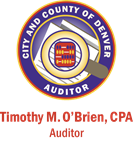Denver Zoo Agrees To Improve Compliance and Governance in Response to Audit
From the Denver Auditors Office January 19 2017
Reprinted from Denver Auditor Page
Denver – After a rocky start, the Denver Auditor’s Office succeeded in completing its audit of the Denver Zoo. The Zoo agreed to the Auditor’s eight recommendations to improve compliance with its City contract, the Cooperative Agreement, and strengthen the governance of the Denver Zoological Foundation to better fulfill its role as the City’s agent in operating this treasured Denver institution.
“In the 60 years that the Cooperative Agreement has been in place, my office had never exercised its authority to audit the operation of that agreement,” explained Timothy M. O’Brien, CPA. “At first, Zoo representatives maintained that the Foundation lay outside the Auditor’s purview. After intervention from the City Attorney and the Mayor’s office, I’m happy to report that Zoo officials cooperated fully with our audit.”
Denver’s audit team found that both the City and the Foundation had not adequately complied with certain sections of the Cooperative Agreement. The City and the Zoo do not follow the terms of the Agreement. Certain payments have not been made, and the Foundation has not formally submitted the Zoo’s annual budget proposal to the City for approval before being adopted by the Foundation’s Board.
Auditors also found that the Zoo’s Board of Trustees did not adhere to relevant best practices. Board members are not consistently attending meetings as required by the Foundation’s bylaws, and there was no formal training program for new Board members, among other areas in need of improvement. The lack of a consistent onboarding process left some Board members unaware of the roles and authority of the Board. Improvements recommended by the auditors were creating a Board charter, implementing non-voting status for the CEO, involving the entire Board in evaluating the CEO, and placing the Executive Director of Parks and Recreation on the Zoo’s Executive Committee.
Animal welfare has been an ongoing concern of Zoo visitors and neighbors. Although the Zoo has been an accredited member of the Association of Zoos and Aquariums (AZA) since 1976, the Cooperative Agreement does not require such accreditation, nor does it mandate a license from the U.S. Department of Agriculture (USDA). The audit also contains an extensive discussion of the use of recycled water. The USDA is responsible for enforcing the Animal Welfare Act (AWA), which imposes standards and requirements for housing animals. Specifically, it requires that animals have access to potable water. However, the AWA has not established regulations concerning the safety or appropriate use of recycled water around animals in captivity. While the state of Colorado has jurisdiction over recycled water, its guidelines do not address the safety of using recycled water around animals, leaving a gap in oversight of recycled water in a zoo setting. A 2013 California study on the use of recycled water in zoos concluded that more data is needed on potential toxicity to animals from incidental ingestion, particularly with emerging contaminants of antibiotics, steroids, and hormones.
A proposed waste-to-energy plant at the Zoo was abruptly terminated in 2015, after incurring significant capital expenditures. “While the Zoo has attempted to sell the plant or the technology for use at a different location, we’re told there is no buyer yet,” said Audit Supervisor Katja Freeman. “Consequently, the Zoo took a $1.7 million write-off for the project.”
The Zoo received more than $2 million from the City’s General Fund, and another $8.5 million in funding from the Scientific and Cultural Facilities District in 2016. A special revenue fund was designated to pay for operational support such as for the Zoo’s water and utilities. In addition, the City has issued bonds that have paid for Zoo improvements, including $2.2 million for the Tiger Exhibit.
The auditors were also able to provide assurance about some aspects of the Foundation’s management of the Zoo. The Zoo’s accounting practices are consistent with Generally Accepted Accounting Principles. Its Board decisions are documented, financial updates are provided at each Board meeting, and members submit standard conflict-of-interest statements.
“We all value the Zoo,” said O’Brien. “The purpose of the audit is to improve service delivery and ensure that this community asset remains healthy for generations to come.”
Denver Post Jan. 20 2017
Denver Business Journal Jan. 19 2017
Channel 9 Jan. 19 2017
![]()



Comments
Denver Zoo Agrees To Improve Compliance and Governance in Response to Audit — No Comments
HTML tags allowed in your comment: <a href="" title=""> <abbr title=""> <acronym title=""> <b> <blockquote cite=""> <cite> <code> <del datetime=""> <em> <i> <q cite=""> <s> <strike> <strong>